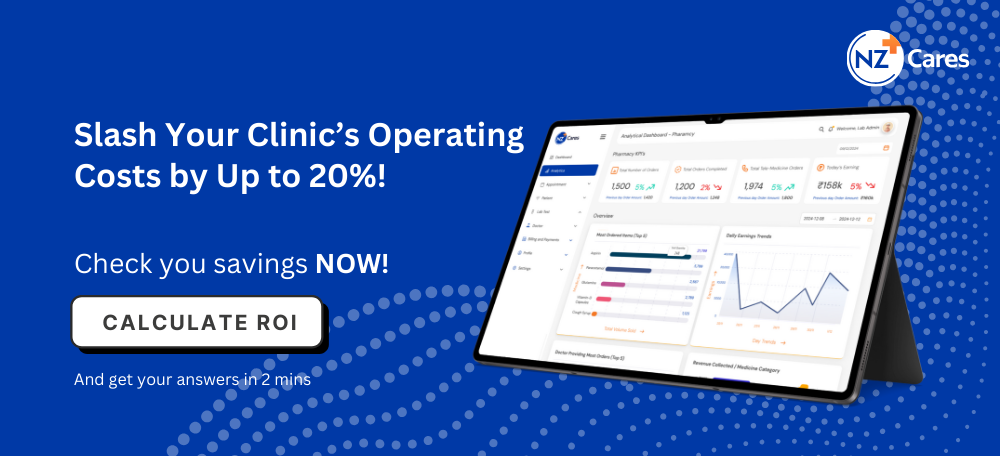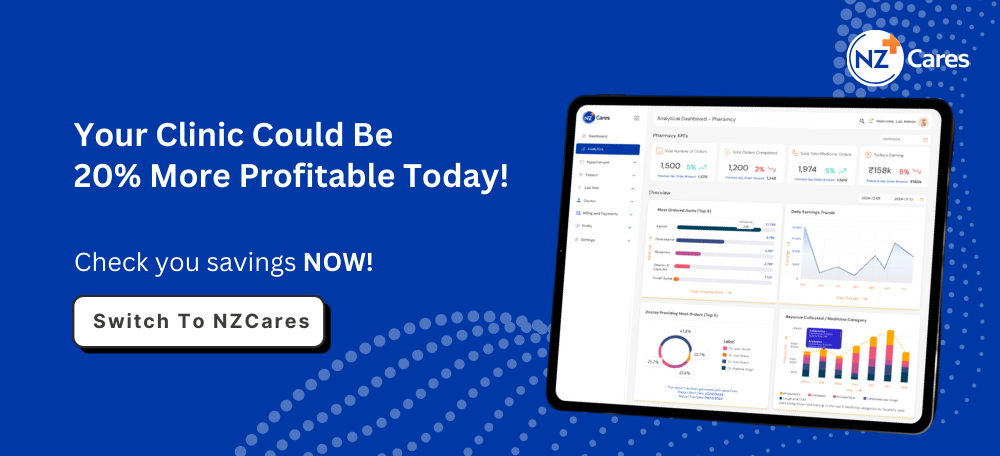Hospital management systems (HMS) are leading the charge, using healthcare business intelligence to spot trends and make smart use of resources. Healthcare data analytics is shaking things up in hospitals and clinics. About 80% of healthcare spots now use analytics, way up from just 15% a decade ago. That’s a big leap! With more patients coming in and costs climbing, data helps make better choices.
In 2025, experts think the healthcare analytics market will hit 75 billion

Hospitals are swimming in data from all kinds of places, like electronic health record programs, medical EHR software, wearable gadgets, and patient surveys. Predictive analytics in healthcare digs into this info to catch health risks early, which means better care for patients. Machine learning in hospital operations makes these insights even sharper, helping doctors and staff decide with confidence.
Data analytics isn’t just numbers; it’s about helping people. By finding patterns in huge datasets, hospitals can improve care, cut wait times, and save money.
This journey shows how big data use cases in healthcare management are changing the game, making every decision count for patients and staff alike. Moreover, it will provide how HMS analytics drive operational efficiency and a peek into how data is making healthcare decision making easy.
Decoding Healthcare Data Analytics
Healthcare data analytics act like a roadmap for hospitals to guide them for better and efficient future decisions. It utilises healthcare information management systems to go through hundreds of documents and files from EHRs, labs results, patients feedbacks, claims, and even study medicare programs present in the system.
This process turns raw numbers into clear ideas that help doctors and managers improve patient care and keep things running smoothly. Hospital information management systems pull all this data together, making it easier to spot what’s going on.
Core Concepts of Healthcare Analytics
- Information Lifecycle Management (ILM): The role of ILS is to organize data right from the start to its deletion to make sure it’s secure and safe.
- Technology Acceptance Model (TAM): It’s concept that gives clarity and explanation to hospital staff by highlighting the analytics tools advantages.
- Decision Support Systems (DSS): Blends analytics into tools that guide doctors and managers on patient care and planning.
- Evidence-Based Medicine (EBM): Uses analytics to back up treatment choices with solid research, matching patient needs.
- Data Quality Frameworks: Sets rules to make sure data is accurate and complete for trustworthy insights.
- Interoperability Protocols: Helps different systems share data smoothly, creating a fuller picture for analysis.
Exploring Types of Healthcare Analytics
Ever wonder how hospitals make sense of all their data?
The secret lies in four types of analytics, each with a unique role in making healthcare better. From looking back at past trends to planning the next steps, these tools help hospitals stay sharp and patient-focused.
Hospitals collect data from everywhere such as medical EHR software, patient feedback, and even insurance claims.
Each analytics type digs into this data differently, helping with everything from spotting busy times to preventing illnesses. By understanding these, hospitals can boost how HMS analytics drive operational efficiency and keep patients happy. Let’s explore the four types that are changing the healthcare world.
Descriptive Analytics
Descriptive analytics looks at old data, like patient visit records, to find trends. For example, it can show when hospitals get busiest or check if patient data security measures are working. This helps plan resources and improve care quality, setting the stage for smarter future decisions.
Predictive Analytics
Predictive analytics in healthcare uses historical information to predict the likely outcome that can positively impact healthcare facilities. With machine learning in hospital operations, it spots risks early, letting doctors act fast. This leads to better patient results and smarter use of hospital resources.
Prescriptive Analytics
Prescriptive analytics goes a step further, acting like a guide. It doesn’t just predict problems, it suggests what to do about them. For instance, it can recommend specific treatments or ways to schedule staff better. This boosts improving patient outcomes through analytics by ensuring care is tailored and operations are efficient.
Diagnostic Analytics
Diagnostic analytics digs into data to figure out why things happened, like why a disease spread or why wait times spiked. By studying both past and current data, it uncovers causes, helping hospitals fix issues and plan better. This makes care more effective and keeps things running smoothly.
Empowering Decisions with Hospital Management Systems
As these systems collect and process data from electronic health record programs, billing systems, and patient appointment scheduling software. It creates a centralized platform or dashboard for doctors, nurses, and administrators for them to look at all the metrics.
Moreover, HMS provides clear insights that improve patient care and streamline hospital processes. Sources, such as patient records and operational logs are utilized for HMS to analyse the data to identify trends, like high admission periods or resource demands.
Key Applications of HMS in Decision-Making
- Healthcare Dashboards and Reports: HMS dashboards display real-time data from multiple sources. They highlight issues, such as delays in patient appointment scheduling software, enabling quick solutions to improve care.
- Patient-Staffing Allocation: HMS examines historical admission data to predict patient volumes. It helps in allocating staffing schedules while also using strategies to reduce healthcare costs.
- Telemedicine Integration: Through healthcare data analytics, implementing telemedicine in small illnesses is effective as doctors can easily study patient history remotely.
- Electronic Health Records (EHR): HMS integrates medical EHR software to analyze patient histories which help identify health risks and better resource allocation.
- Early Detection of Chronic Diseases: Hospital management systems are equipped with AI algorithms that use demographic and medical data to identify at-risk patients. It significantly helps in early detection to reduce hospitalizations.
- Practitioner Evaluation: HMS analyzes patient feedback to assess staff performance. This informs training, fostering high-quality care.
- Advanced Medical Imaging Analysis: HMS applies machine learning in hospital operations to process imaging data to speed up diagnoses and prioritizes urgent cases.
- Inventory Management: HMS tracks medical supplies, predicting shortages based on usage, ensuring bed availability and effectively minimise care delays.
- Patient Flow Optimization: Due to real-time data availability, HMS helps streamline patient movement which significantly reduces wait times and enhances patient experiences.
By applying big data use cases in healthcare management, these systems strengthen decision-making and elevate healthcare delivery.
Benefits of HMS Analytics for Healthcare
Healthcare data analytics comes with a variety of advantages for healthcare organizations by leveraging data to improve decision-making and operational performance. Here are some of the key benefits of integrating analytics into hospital management systems.
- Enhanced Patient Care: AI and ML analytics identifies at-risk patients for early disease detection which significantly improve personalized care and better health outcomes.
- Operational Efficiency: HMS analytics optimizes scheduling and resource use reducing wait times and improves patient experiences.
- Cost Reduction: It identifies inefficiencies, such as unnecessary tests. This lowers costs while maintaining care quality.
- Improved Data Security: Data analytics safeguards patient information through robust monitoring. This ensures compliance with regulations.
- Staff Development: Effectively evaluates staff performance using feedback. This guides professional growth and elevates care standards.
- Accelerated Diagnoses: It enhances imaging analysis for faster detection. This enables timely and accurate treatments.
- Resource Optimization: It forecasts supply and staffing needs ensuring efficient resource use without shortages.
- Patient Satisfaction: HMS analytics streamlines operations for shorter wait times. This boosts patient trust and satisfaction.
Real-World Impact: HMS Analytics in Action
Real-time analytics in hospital management improves care and efficiency across healthcare settings, including hospitals, clinics, and labs. Healthcare facilities often face long wait times, causing patient frustration. Inconsistent staffing leads to high costs during slow periods and shortages during peaks.
Fragmented data from electronic health record programs delays decisions, slowing chronic disease detection. High costs strain budgets, limiting care improvements. Outdated systems lack real-time insights, making it hard to fix issues.
Solutions to Challenges
- Integration and Interoperability of Diverse Data Sources: Healthcare facilities adopt standardized formats and API integrations to enable smooth data sharing between medical EHR software and administrative systems.
- Data Privacy and Security Concerns: Facilities use encryption and regular security audits to comply with regulations like HIPAA, protecting hospital information management systems.
- Data Quality and Completeness: Facilities implement data governance with cleansing and validation to ensure accurate analytics.
- Scalability of Data Infrastructure: Cloud-based platforms support real-time analytics, managing increased data volumes efficiently.
- Lack of Resources: Skills Challenges: Facilities train staff and collaborate with analytics experts to build expertise in HMS tools.
- Responsiveness to Change: Facilities promote data-driven cultures through training, reducing resistance to new technology.
- Cost of Implementation: Facilities use phased implementation to distribute costs, making adoption affordable.
Case Study Results
- Wait times dropped by 35% in six months.
- Staffing costs decreased by 18%.
- Chronic disease detection rose by 25%.
- Operational costs fell by 15%.
- Patient satisfaction improved by 20%.
NZCares: Revolutionizing Healthcare with Analytics
NZCares is a comprehensive hospital management system for hospitals, clinics, labs, and pharmacies. It processes patient data to streamline operations and enhance care through extensive data analytics and machine learning algorithms. By reducing wait times and supporting early illness detection, NZCares improves outpatient experiences.
HMS Analytics Capabilities
- Patient 360-Degree Profile: Predictive and cognitive analytics track patient health, enabling preventive care.
- Healthcare Financials: Analytics monitors metrics to reduce inefficiencies, promoting cost savings.
- Performance Metrics and Analysis: Continuous tracking refines strategies for better outcomes.
- Real-Time Dashboards: Live insights into patient flow improve decision-making.
- System Interoperability: Integration with medical EHR software ensures unified data analysis.
- Staff Performance Insights: Performance data informs training, boosting care quality.
Conclusion
Healthcare data analytics transforms medical care by turning vast datasets into actionable insights. This blog explored how hospital management systems (HMS) drive decision-making. Descriptive analytics reveals past trends, while predictive and prescriptive analytics guide future actions, as discussed in the types of analytics section.
HMS empowers providers through tools like dashboards, telemedicine, and early disease detection, and provides benefits like cost reduction, better patient care, and efficiency.
Facilities seeking this transformation can trust NZCares, which offers comprehensive coverage of medical departments and seamless workflow management. Consider NZCares, to unlock a path to smarter, patient-focused care with positive outcomes.

